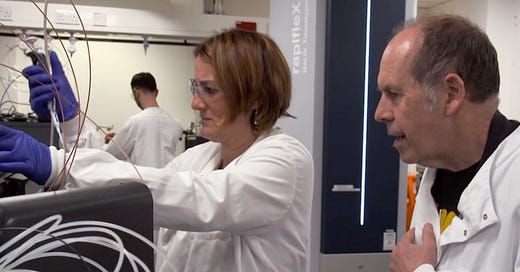What would it mean if there could be a simple test for Parkinson’s, less invasive than a PCR test for Covid with results delivered pretty much on the spot? The BBC programme The One Show sent me to Manchester to meet two remarkable women who are working on just such a test. (If you’re in the UK you can see my report here - it’s the first item in the programme.)
I say “meet” but my encounter with one of the women, retired nurse Joy Milne, was via a Zoom call from Manchester University’s Institute of Bioscience. Joy’s story is well known - she is the woman who can quite literally smell Parkinson’s. She detected a distinctive musky smell from her husband Les years before he was diagnosed.
Joy was born with a heightened sense of smell - a condition known as hyperosmia - and after initial scepticism from the medical community, her abilities were put to the test. She was given 12 t-shirts to smell, six from people with Parkinson’s, six worn by poeple without the condition. She identified all six “Parkies” and there was one false positive amongst the healthy group - except that he was diagnosed within the year.
But to use the language of the tech world, Joy’s extraordinary skill doesn’t scale - she can’t take her remarkable nose all over the country to smell Parkinson’s. But what she has done is work with Perdita Barran, Manchester’s Professor of Mass Spectrometry, to devise a test which builds on what she is smelling - something in a substance called sebum which is found in the skin.
So I donned a white coat and headed with Perdita into a lab packed with expensive kit. The professor then took a swab of the sebum on the back of my neck and inserted it into one of the machines, a mass spectrometer of the kind found in most hospitals and used for tests like those carried out on newborn babies.
My swab immediately produced a readout of sharp peaks and troughs on a computer screen and the professor told me that showed I had Parkinson’s. Why?
“All of us have lots of molecules on our skin,” she explained. “If I took a healthy person I would find about 5000 If I take the same sample from someone with Parkinson's disease, they'll also have 5000 but about 500 of them are present in a greater amount.”
The test appears to be a lot more accurate than a GP’s verdict after watching you walk around the surgery a couple of times, and a lot cheaper and easier than the DAT-scan examination of the brain you are sent for after initial diagnosis. There is still some way to go in perfecting the system but getting a swab test for Parkinson’s that you can stick in the post to the lab could become commonplace within a few years.
The question remains - what would you feel about learning earlier that you had this degenerative condition? With no cure available it might just mean more years of worry. On the other hand everything we are learning about the importance of exercise and diet suggests that being forced to adopt better habits earlier would be a good thing.
And another thing - if we Movers and Shakers had all known earlier then we could have launched our podcast a lot sooner. By the way, look out in the next few days for some exciting news about our plans .




Would I want to know sooner?
I've noticed there can be a cultural aspect to this question. Americans, oozing with positivity, tend to take the view that the sooner you know, the sooner you can make lifestyle changes like diet and exercise to start fighting it. More cynical Brits say why would you want the cloud of an incurable disease casting a shadow over your life for several years longer?
For myself, I ran two marathons in the year before I was diagnosed, the latter with considerable difficulty, so I doubt lifestyle changes would have made any difference. I'm pleased I didn't find out until I needed to: I got to live my life for a few more years, rather than obsess over the condition that now pervades pretty much every aspect of my day.
I’d like to have known earlier. Vigorous exercise, diet modification, bucket lists: all best done sooner rather than later.
But if we’re going to diagnose earlier, the NHS guidance to the newly-diagnosed will need to be much less drug-focused than at present.